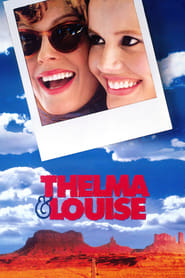Strong-willed female leads are more prevalent and popular (Million Dollar Baby, Winter’s Bone, and Quentin Tarantino’s Kill Bill diptych, just to name a few), but they often are about how a woman finds her place in male-dominated hierarchies and often involve a hunt for a man. In short, Thelma & Louise is more radical in the sense that the men in the movie are largely in search of the women and the women are largely ambivalent toward the men.
— Chris Cabin & Ed Gonzalez (Slant Magazine)
Thelma and/or Louise are shown indoors just three brief times, once in CCTV footage, and twice when they make phone calls from roadside pit stops. Each such instance is instrumental in getting them caught: in Thelma & Louise, interiors and the homely protections they promise are a trap. It’s only outdoors […] that you can truly be yourself. [Indeed,] the dangerous lure of domesticity—its safety, its comforts, its smallness—is understood by many a classic western hero.
— Jessica Kiang (Criterion)
Thelma is a beautiful bundle of walking contradictions. She’s sexually adventurous but dangerously immature; she’s innately trusting but cannot be trusted on her own; she’s a devoted optimist who is slowly losing her faith in humanity. Davis explores these maddening tensions without judgment.
— Rachel Syme (Criterion)
I was hoping that the film would irrelevant thirty years later.
— Callie Khouri (screenwriter)

